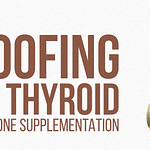Advertisements
📝 Bioenergetic Basics 6-Part Crash Course:
• Patreon: https://bit.ly/bbcoursepat
• Gumroad: https://bit.ly/bbcoursegum
🗣️ One-to-One & Group Coaching:
https://www.patreon.com/dannyroddy
Timestamps
00:00 - Intro
01:00 - Ultra-high-temperature pasteurized milk, raw milk is overrated, pasteurized milk, A2 milk, adding sugar, goat milk
02:26 - Overgrowth of bacteria as a cause of milk allergy, raw carrot salad, well-cooked white button mushrooms, erythromycin, penicillin VK, clarithromycin, neomycin, tetracycline, doxycycline, flowers of sulfur
03:12 - Progesterone, pregnancy, lactase
04:01 - Emphasizing calcium over phosphorous to reduce inflammation (parathyroid hormone, estrogen endotoxin, etc.)
Selected References:
[DO YOU RECOMMEND UHT MILK FOR CALCIUM?] "Yes, I know several people who do very well with ultrapasteurized milk." — Ray Peat (2016)
"Since a sluggish liver is the most common cause of hypoglycemia, it should follow that the hypothyroid patient is highly susceptible to low blood sugar." — Broda Barnes. Hope for Hypoglycemia. (1978)
“When the sugars are increased the hypersensitivity reactions are decreased. When sugar is decreased, the reaction is increased. Therefore, to avoid hypersensitivity reactions, sugars in the body fluids should be kept high by feeding well, he said.” — New View of the Old Cold — As Sugars Go Up, Hypersensitivity Drops. (1963)
"It is possible that once SIBO is established during the hypothyroid phase, it does not clear spontaneously, even if made euthyroid." — Lauritano, E.C., et al. Association between hypothyroidism and small intestinal bacterial overgrowth. J Clin Endocrinol Metab. 2007 Nov;92(11):4180-4.
“Bacterial overgrowth in the small intestine can be caused by hypothyroidism, and the substances produced by these bacteria can damage the lining of the small intestine, causing the loss of lactase enzymes (Walshe, et al., 1990).” — Ray Peat, PhD
"Fifty two strains of anaerobic bacteria isolated from the upper gut of patients with small intestinal bacterial overgrowth were screened for phospholipase activity... Culture supernatant and deoxycholate, both alone and combined, significantly reduced lactase, sucrase, and maltase activity. Electron microscopic evidence showed degeneration of microvilli, disruption of mitochondrial structure, and swelling of the endoplasmic reticulum after exposure of the intestinal loops to the supernatant or deoxycholate." — Walshe, K., et al. Effects of an enteric anaerobic bacterial culture supernatant and deoxycholate on intestinal calcium absorption and disaccharidase activity. Gut. 1990 Jul;31(7):770-6.
"A limited course of treatment [of flowers of sulfur] caused a significant increase in lactase activity and restored tolerance for prolonged periods in patients with clinical lactose intolerance." — Khan, A S. The effect of ingested sublimed sulfur on lactose intolerance. Clinical and Investigative Medicine; Apr 2004; 27, 2; ProQuest Central Student pg. 81
“The results obtained do not indicate a close relationship between the dose of the drug [medroxyprogesterone acetate] and the extent of alteration in the rat intestinal digestive and absorptive functions." — Nagpaul JP., et al. Effect of various doses of medroxyprogesterone acetate on intestinal functions in rats. Indian J Gastroenterol. 1990 Jan;9(1):45-7.
"Women with lactose malabsorption handle lactose better than usual in late pregnancy. Slow intestinal transit and bacterial adaptation to increased lactose intake may be primarily responsible.” "Progesterone, levels of which are markedly elevated during pregnancy, may also play a role in increasing intestinal lactase levels...” — Szilagyi, A., et al. Lactose handling by women with lactose malabsorption is improved during pregnancy. Clin Invest Med. 1996 Dec;19(6):416-26.
"It is universally agreed that hypercalcemia leads to accelerated degradation of PTH within the parathyroid cells." — Martin, C.R. Endocrine Physiology. 1985.
"In addition, increased PTH levels were highly correlated with levels of emotional and physical abuse and neglect." — Liam Davenport. 'Calcium Imbalance' Linked to Bipolar Severity https://archive.is/9gbxU May 11, 2021
“…It is important to point out that low levels of parathyroid hormone (PTH) are essential for maintaining healthy bone structure and normal remodeling.” — Endocrine Physiology Constance R. Martin (1985)
“It is well known, for example, that estradiol (the major estrogen secreted by the ovaries) increases the expression of parathyroid hormone (PTH) and calcitonin, the principle hormones involved in calcium regulation.” — Thys-Jacobs S., et al. Society for Women's Health Research. Nutrition research: the unique needs of women. 2000.
“This controlled dose-response study showed that phosphorus has a dose-dependent effect on S-PTH and increases PTH secretion significantly when calcium intake is low. Acutely high phosphorus intake adversely affects bone metabolism by decreasing bone formation and increasing bone resorption, as indicated by the bone metabolism markers.” — Kemi VE, Kärkkäinen MU, Lamberg-Allardt CJ. High phosphorus intakes acutely and negatively affect Ca and bone metabolism in a dose-dependent manner in healthy young females. Br J Nutr. 2006 Sep;96(3):545-52.













Share this post